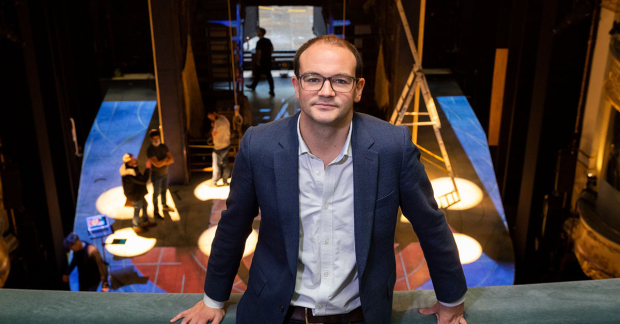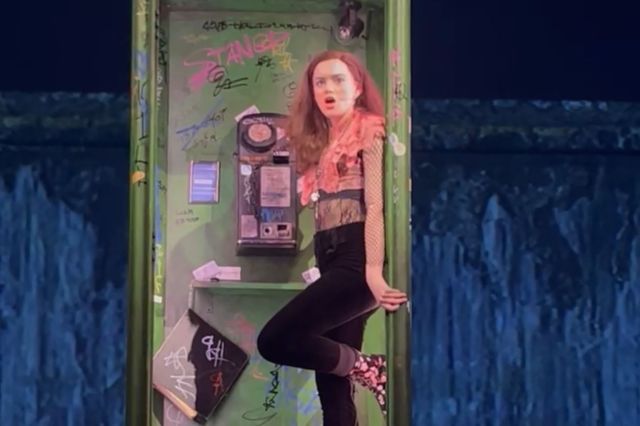Life of Pi producer: 'The idea of seeing something and forgetting it on the tube home is not acceptable'
Simon Friend prepares to open the five-star production in London

© Ellie Kurttz
When the WhatsOnStage Award-winning adaptation of Yann Martel's Life of Pi opened at Sheffield Crucible, producer and commissioner Simon Friend was also welcoming his first son.
What would undoubtedly have been a surreal, sleep-deprived week, Friend emerged knowing one thing: the show was a runaway hit – five stars across the board, awards aplenty: the stage was set for an assured and speedy West End transfer. Of course – plans were hit by a bit of a snag (the pandemic has had a way of doing that), but the show's now back and primed for its first preview tonight. When it does open, it'll be in a modified West End venue unlike anything audiences will have seen before.
It'd be rude to spoil too much but it's safe to say the show's home (for the foreseeable future), the Wyndham's Theatre, looks radically different. Friend is throwing a lot at the wall, knowing from experiences in Sheffield that all of it will likely stick. New, elevated stalls seats rise like buoys on a wave to meet the thrust stage, which is sloped and replete with revolve, trapdoors and more.
Convention is thrown out of the window – Pi's tale surges out of the proscenium like carried by some unquenchable storm. Think the recent Fiddler on the Roof West End run on steroids. (Friend, chatting last week, admits he approached production manager Simon Sturgess after seeing his work on the Playhouse production).
The modifications to the theatre are unprecedented – for the first time, venue owner Cameron Mackintosh has allowed the team to drill two holes and hang a truss, featuring some chunky speakers, inside the auditorium, rather than placing equipment behind the curtain. Friend explains: "Cameron was incredibly supportive, and very keen to have this show in one of his theatres. We've had to make sure everyone could see – once you're in front of the iron, sight lines become very important."
Making the changes have also hit the production's margins, but for the sake of guaranteeing a top-tier time for punters: "We've lost around 80 in capacity – in an already relatively small theatre, it was a big sacrifice. But it was one to give the remaining the seats the very best experience. Coming to the West End now is not a cheap night out. The idea that you can see something and then forget it on the tube home is not acceptable. We have to punch above that."
What's most fascinating is that audiences will get remarkably different experiences from where they're sat: in the stalls, as one critic remarked in Sheffield, the water will feel as though it'll be lapping at their toes: spectators will feel like they're inside Pi's boat, braving the storm together. From the circle, you get a more panoramic view – the full scale of the technical majesty will be easier to capture in its entirety.
It's the circle where I chat to Friend – who has hit the ground running with new projects in recent months: he is co-producing the new Florian Zeller drama The Forest, announced last week, while preparing for a tour of The Da Vinci Code in the new year. But first he has to get Pi open.
The cast is a lot bigger than the Sheffield run (given the physical demands of the piece, this is unsurprising). But they're at the forefront of a wide celebration of puppeteering across British theatre, Friend explains: "We're seeing more and more now, incredible puppetry – like The Magician's Elephant at the RSC, at the Bridge in their Christmas show, or in The Ocean at the End of the Lane. But here, we really wanted to make sure that the puppets are characters in their own right – especially the tiger Richard Parker. What puppet designers Finn Caldwell (also puppetry and movement director) and Nick Barnes have done is create incredibly intricate sculptures that the company then bring to life – I just don't know how they do it – it's extraordinary."
Why did Friend option the piece? Aside from Martel's riveting narrative, adapted for the stage by Lolita Chakrabarti, he explains how much it feels like it was made for live experience: "This is a story that should be augmented by the imagination. While film is a pretty literal medium, in theatre you have to let the audience's mind fill in what isn't seen. Which means, for this story in particular, it works so well on stage." These puppets are involved in gritty, almost savage scenes, and Friend warns that there are some "quite intense moments of confrontation, and the fact you're shocked is even more impressive."
Outside the venue is something else Friend is proud to display – an eye-catching LCD screen running across the frontage – the same front that was occupied by scores of football fans over the summer. Now it's got a state-of-the-art makeover and is ready to welcome audiences: Friend finishes on an optimistic note: "I hope this is unique – there's nothing in the West End like it."












